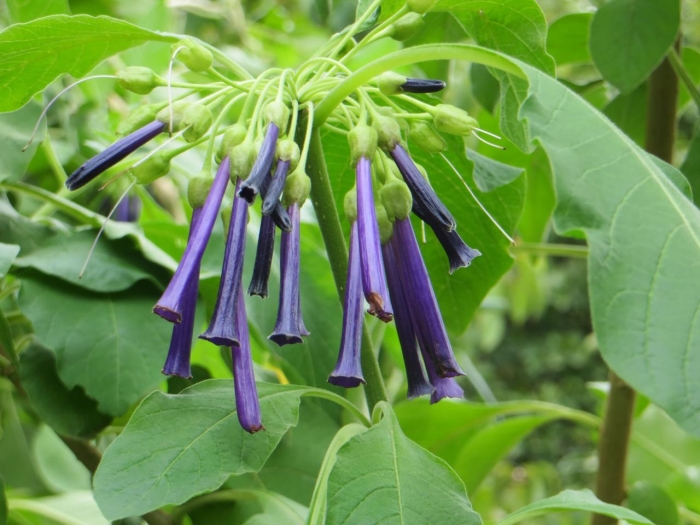Blue Cestrum
(Iochroma cyaneum)
Blue Cestrum (Iochroma cyaneum)
/
/

Vix_B
CC BY 2.0
Image By:
Vix_B
Recorded By:
Copyright:
CC BY 2.0
Copyright Notice:
Photo by: Vix_B | License Type: CC BY 2.0 | License URL: https://creativecommons.org/licenses/by/2.0 | Uploader: Flickr upload bot | Publisher: Wikimedia Commons | Title: Quinta_do_Palheiro_Ferreiro,_Funchal_-_Madeira,_October_2012_(21).jpg | Notes: {{Information |Description= ''Ipomoea leptophylla'' Cave National Park, South Dakota, USA |Source= http://www.nps.gov/wica/photosmultimedia/photo%2Dgallery%2Dwildflowers%2Ehtm?eid=133239&root_aId=169#e_133239 |Date= June 26,
































Estimated Native Range
Summary
Iochroma cyaneum, commonly known as Blue Cestrum, is an evergreen shrub native to the cloud forests of the Andes in South America. This species typically grows to a height of 10-13 feet (3-4 meters) and a width of 5-6 feet (1.5-2 meters). It has a bushy habit with elongated leaves and tubular flowers that are most often blue or purple, attracting hummingbirds and other pollinators. The flowering season extends from spring to fall, with the blooms being quite showy and abundant.
Blue Cestrum is valued for its long flowering season and vibrant flower color, which can add a tropical feel to temperate gardens. It is often used in mixed borders, as a specimen plant, or for creating a privacy screen. In cultivation, it requires protection from strong winds and prefers a sheltered position. While it tolerates a range of soil types, it thrives in well-drained, fertile soil and benefits from regular watering, especially during dry periods. It can be grown in full sun to part shade, with part shade being preferable in hotter climates to prevent leaf scorch. Pruning can be done after flowering to maintain shape and promote bushier growth. Be aware that all parts of the plant are toxic if ingested, and it can be susceptible to pests like aphids and whiteflies.CC BY-SA 4.0
Blue Cestrum is valued for its long flowering season and vibrant flower color, which can add a tropical feel to temperate gardens. It is often used in mixed borders, as a specimen plant, or for creating a privacy screen. In cultivation, it requires protection from strong winds and prefers a sheltered position. While it tolerates a range of soil types, it thrives in well-drained, fertile soil and benefits from regular watering, especially during dry periods. It can be grown in full sun to part shade, with part shade being preferable in hotter climates to prevent leaf scorch. Pruning can be done after flowering to maintain shape and promote bushier growth. Be aware that all parts of the plant are toxic if ingested, and it can be susceptible to pests like aphids and whiteflies.CC BY-SA 4.0
Plant Description
- Plant Type: Shrub
- Height: 6-8 feet
- Width: 6-8 feet
- Growth Rate: Moderate
- Flower Color: Purple
- Flowering Season: Spring, Summer, Fall
- Leaf Retention: Evergreen
Growth Requirements
- Sun: Full Sun, Part Shade
- Water: Medium
- Drainage: Medium
Common Uses
Bee Garden, Bird Garden, Butterfly Garden, Deer Resistant, Hummingbird Garden, Low Maintenance, Showy Flowers
Natural Habitat
Native to the cloud forests of the Andes in South America
Other Names
Common Names: Violet Churur, Violer Bush, Violet Tubeflower, Pipviolbuske
Scientific Names: , Iochroma cyaneum, Iochroma tubulosum, Iochroma lanceolatum, Iochroma weberbaueri, Dunalia tubulosa, Habrothamnus cyaneus, Cestrum cyaneum, Chaenesthes lanceolata, Meyenia cyanea,
GBIF Accepted Name: Iochroma cyaneum (Lindl.) M.L.Green